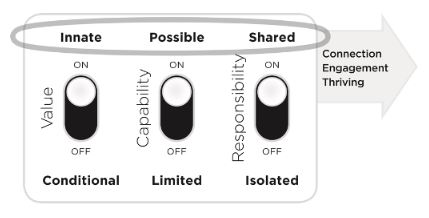Most leaders face this dilemma every day, especially when the stakes are high: preserve the relationship or push for results? This is the compassion vs. accountability dilemma.
Connection or results?
Sadly, compassion and accountability are too often seen as being in tension — leaders feel they have to pick one or the other. But solely prioritizing accountability can create toxic work environments that drive away good talent. On the other end of the spectrum, being too nice can compromise performance and productivity.
Top of mind for CEOs around the world is attracting, developing and retaining top talent. What does that require? The new generation wants leaders with interpersonal communication skills who deliver on relationships AND results; no compromises. The good news is you don’t have to compromise. Compassion and accountability are not opposites. In fact, compassion includes accountability.
An evolved definition of compassion
Compassion is much more than most leaders realize. It originates from the Latin root word, compati, meaning “to struggle with.” The secret to next-generation leadership is adopting a more evolved definition of compassion: Compassion is the practice of demonstrating that people are valuable, capable and responsible in every interaction.
Turn on three switches to activate your leadership superpower
Change begins with mindset. The compassion mindset has three switches: value, capability and responsibility. When they are turned on, energy flows and cultures thrive. When they are turned off, energy is blocked and cultures languish.
The value switch
Powering this switch is the belief that people are unconditionally valuable. Everyone deserves to be valued for who they are as a person, with no strings attached.
- Validate experiences: Listen to your people, hear their concerns and don’t judge their experiences or feelings. Employees want to feel heard and affirmed.
- Get vulnerable: Share your joys and fears. Let people know how you are really doing. It doesn’t make you weak, it makes you human.
- Separate the person from the behavior: Valuing a person for who they are doesn’t mean letting the behavior slide. But it does mean upholding dignity and respect, even during difficult conversations about performance.
The capability switch
Powering this switch is the belief that anyone can be part of the solution. Our unique qualities, skills and experiences deserve to be affirmed, and we deserve the opportunity to contribute, learn and grow in a collaborative environment.
- Seek first to understand: Talk less, listen more and get curious.
- Invite people to be part of the solution: Nothing invites ownership more than being included at the ground level.
- Turn failures into learning opportunities: Create a safe space where people can experiment, fail, learn and grow.
The responsibility switch
Powering this switch is the belief that everyone is responsible for their own thoughts, feelings and actions. Regardless of what happened before, we are each 100% responsible for what we do next. No more, no less.
- Respect boundaries: Stop over-thinking, -feeling and -doing for others. You are accountable to your people, but they are responsible for their behaviors.
- Ask others to step up: It’s OK to have high standards and to ask for commitments without using fear or intimidation.
- Prioritize and focus: Keep your eye on the guiding principles of your organization. Don’t get distracted by petty power struggles and tangents.
Why build your culture of compassionate accountability?
Brand is a lagging indicator of the quality of your culture. Culture is the sum of every interaction between your people. Cultures where leaders regularly interact with compassionate accountability are:
- 3.4x more likely to be rated as a best place to work
- 3.3x more likely to retain high-potential employees
- Perform better financially
Compassionate accountability is the process of building connection while getting results. Turn on your switches and unlock your leadership superpower by treating yourself and others as valuable, capable and responsible in every interaction.
Your biggest goals depend on it!
Nate Regier, Ph.D., is the CEO of Next Element, a global leadership consultancy helping companies build cultures of compassionate accountability through culture diagnostics, consulting, training and train-the-trainer certifications. Nate is the author of four books on leadership, compassion and culture. In his newest book, “Compassionate Accountability: How Leaders Build Connection and Get Results,” Nate outlines the road map for the next generation of leaders and thriving workplace cultures. He hosts the “OnCompassion with Dr. Nate” podcast, is a keynote speaker, and can be heard on and seen in multiple podcasts and industry publications. Connect with Nate on LinkedIn.
Opinions expressed by SmartBrief contributors are their own.
_______________________________
Subscribe to SmartBrief’s FREE email newsletter on leadership. It’s among SmartBrief’s more than 250 industry-focused newsletters.

